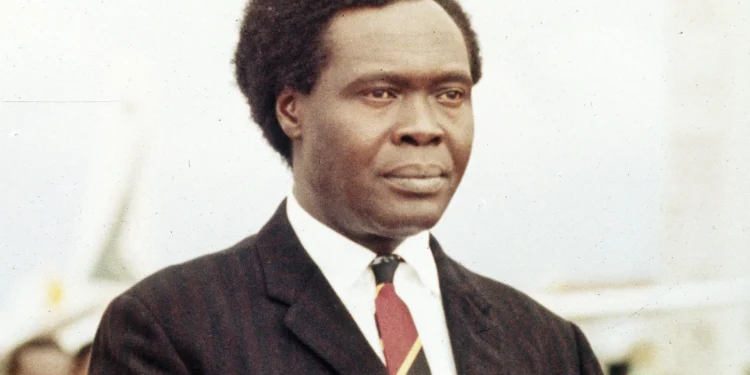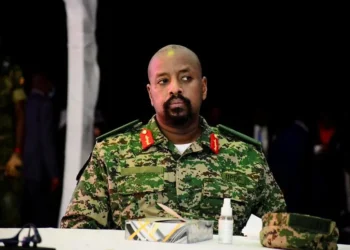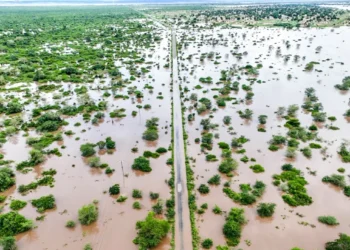Apollo Milton Obote was a pivotal and controversial figure in Uganda’s post-independence history. As the country’s first prime minister and then president for two separate terms, his political career witnessed radical transformations that shaped the course of the Ugandan state, from leading the national liberation movement to establishing a one-party system to periods of internal conflict and exile.
Milton Obote, a Lango (one of Uganda’s ethnic groups), was born around 1925 in the village of Akokoro in Apac District, Uganda Protectorate. His father was a local chief, affording him a good education compared to his peers. He enrolled at Busoga College and Makerere University, then the most prominent institution of higher learning in East Africa, to study arts. However, his academic career was cut short, as he left the college before graduating under circumstances that differ. Some sources indicate he was expelled due to his political activism, while others claim he left in protest against the administration’s policies.
After leaving Makerere, Obote worked in neighboring Kenya for several years, where he became involved in trade union work and the anti-colonial political movement. Influenced by the nationalist ideas spreading across the continent, upon his return to Uganda in 1956, he joined the Uganda National Congress (UNC). He quickly emerged as a capable organizer and orator, and in 1957, he was elected to the colony’s legislative council.
As divisions within the UNC grew, Obote broke away and, with others, founded the Uganda People’s Congress (UPC) in 1959. The party drew its support primarily from the northern and western regions, while Buganda, the largest and most powerful of the country’s traditional kingdoms, enjoyed considerable autonomy and feared the dominance of a strong central government.
To achieve independence and bridge the deep political divide between the Buganda kingdom and the rest of the country, Obote formed an unlikely political alliance with the Kabaka Yekka (KY) party, which represented the interests of the Buganda kingdom. This alliance, known as the “unholy alliance” due to the deep ideological differences between the two parties, enabled them to win the elections that preceded independence.
On October 9, 1962, Uganda gained independence from Britain. Milton Obote became the first prime minister, while Sir Edward Mutesa II, the Kabaka (king) of Buganda, assumed the ceremonial role of head of state. This arrangement was a compromise aimed at preserving a semblance of national unity, but it was fragile from the outset.
Late tensions between Obote and the Kabaka soon emerged. Obote sought to build a strong, centralized state, which directly conflicted with Buganda’s ambitions to maintain its autonomy and special status. The crisis reached its peak in 1966. Following accusations of corruption and gold and ivory smuggling involving Obote and his deputy army commander, Idi Amin, the Buganda parliament demanded that the central government remove its “capital” from Buganda territory. Obote’s response was decisive: he suspended the constitution, declared himself executive president, and ordered the army, led by Idi Amin, to storm the Kabaka’s palace. Kabaka Mutesa fled into exile in London, where he later died, and Obote abolished all traditional kingdoms in Uganda.
In 1967, Obote imposed a new constitution that abolished the federal system and established a strong presidential republic, declaring Uganda a unitary state. This move, known as the “Begone Revolution,” greatly consolidated his power but deepened the animosity between his government and the Baganda people, who felt humiliated and marginalized.
In the late 1960s, Obote began adopting a socialist approach he called “Move to the Left.” He issued the “Common Man’s Charter,” a political document calling for a more equitable distribution of wealth. This was followed by decisions to nationalize major corporations and foreign banks in 1970. These policies alarmed foreign investors and the local business class and led to an economic slowdown. At the same time, he increasingly relied on the state security apparatus to suppress dissent, leading to growing popular discontent.
While Obote was attending a Commonwealth summit in Singapore on January 25, 1971, his army commander, Major General Idi Amin, took advantage of his absence and staged a military coup, seizing power. The coup was initially welcomed by large segments of the population, particularly in Buganda, as well as by some Western powers concerned about Obote’s socialist leanings.
Obote sought refuge in neighboring Tanzania, where President Julius Nyerere, a friend and ally, granted him political asylum. For the next eight years, Obote attempted to organize an armed opposition to Amin’s regime, which soon revealed its brutal nature, causing the deaths of hundreds of thousands of Ugandans and devastating the country’s economy. In 1972, an invasion attempt by Obote-aligned forces from Tanzania failed.
Amin’s regime came to an end in 1979, after he invaded Tanzania. This prompted a counteroffensive by the Tanzanian army, aided by groups of armed Ugandan exiles, that led to Amin’s overthrow and his flight from the country.
After Amin’s fall, and amid the ensuing power vacuum, Obote returned to Uganda in May 1980. In December of the same year, general elections were held, won by his party, the Uganda People’s Congress, amid widespread accusations of fraud and vote-rigging by his opponents, particularly the Democratic Party. This controversial election led to Obote’s return to the presidency.
His second term was difficult from the start. Obote inherited an economically devastated and socially divided country with an undisciplined army. He faced fierce armed opposition, most notably the National Resistance Army (NRA) led by Yoweri Museveni, which resorted to guerrilla warfare in the Luwero Triangle region of central Uganda.
Obote’s government responded to the rebellion with a brutal military campaign. The Uganda National Liberation Army (UNLA), largely composed of soldiers from the northern Acholi and Lango ethnic groups, was accused of committing widespread human rights violations in the Luwero Triangle and other areas that supported the rebels. These violations included mass killings, torture, and forced displacement, with civilian casualties estimated at tens of thousands, if not hundreds of thousands.
Economically, Obote abandoned his previous socialist policies and adopted economic reform programs supported by the International Monetary Fund and the World Bank. These policies succeeded in achieving some economic stability and reducing inflation, but their positive effects did not reach most of the population, who continued to suffer.
By mid-1985, Obote’s government had lost control of large parts of the country. Ethnic divisions within the army itself worsened, particularly between Acholi officers (led by General Tito Okello) and Lango officers (loyal to Obote). On July 27, 1985, Acholi officers staged a military coup that ousted Obote for a second time.
Obote fled again, this time settling in Zambia. He remained in exile for the remainder of his life, never returning to Uganda. He died on October 10, 2005, in Johannesburg, South Africa, where he was receiving medical treatment. His body was repatriated to Uganda, where he received a state funeral by the government of President Yoweri Museveni, his former political rival.



























































